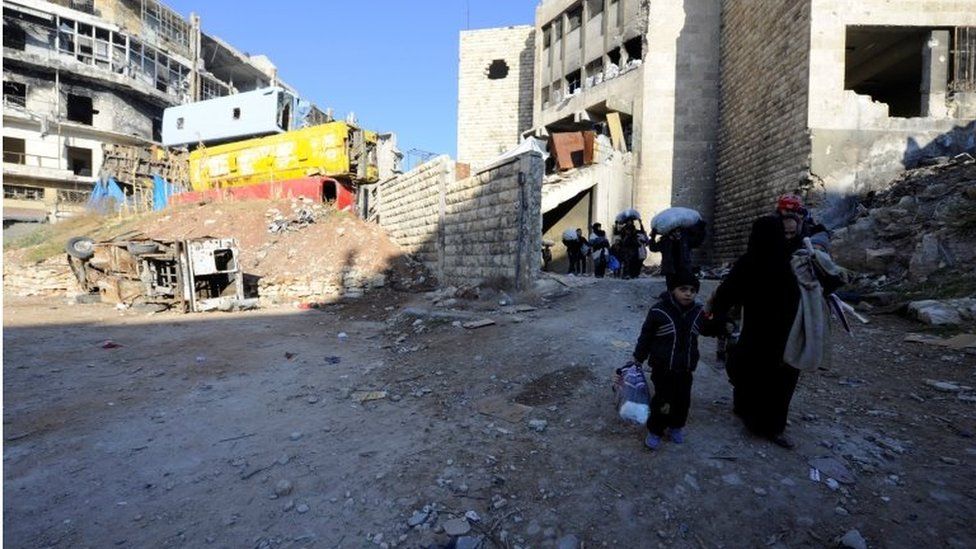Aleppo battle: UN says hundreds of men missing
- Published

Hundreds of men appear to have gone missing after crossing from rebel-held areas of Aleppo into government territory, UN officials say.
Forces led by Syria's government have seized at least 85% of eastern parts of the city from rebels in recent weeks.
Tens of thousands of civilians have fled those districts. Up to 10,500 left during a humanitarian pause on Thursday alone, Russian officials say.
Rebels were also reportedly stopping people from leaving, the UN said.
What are the allegations?
Rupert Colville, the spokesman for the UN High Commissioner on Human Rights, said up to 100,000 people were trapped in "ever-shrinking" areas of eastern Aleppo.
Reports differ on how many people remain and how many have fled eastern Aleppo, but Mr Colville said the UN had gathered evidence that "hundreds" of men may have disappeared after leaving for government-held areas.
"Given the terrible record of arbitrary detention, torture and enforced disappearances by the Syrian government, we are of course deeply concerned about the fate of these individuals," he said.
Reports cited by the UN say men aged between 30 and 50 were separated from their families. Other displaced people reported being taken in for questioning, and having their identity cards confiscated.
Mr Colville also said rebel groups could be committing a war crime by preventing people from fleeing to safety, and "using civilians as pawns".
Lyse Doucet reports from Tariq al-Bab as families who have fled the fighting in Aleppo gather
What's happening on the ground?
Russia, an ally of Syrian President Bashar al-Assad, said fighting was temporarily suspended on Thursday to allow civilians to leave.
Russian Defence Ministry official Sergei Rudskoi said up to 10,500 people, including 4,015 children, had left, although this figure not been confirmed. Military officials earlier put the figure at 8,000.
Russian Foreign Minister Sergei Lavrov has said the fighting will continue as long as rebels remain.
The UK-based Syrian Observatory for Human Rights, a network of activists monitoring the violence, said ground forces continued their offensive, and that rocket attacks and air raids were launched overnight.
Meanwhile, the civilian rescue group known as the White Helmets said 46 civilians were killed and another 230 injured on Thursday in east Aleppo. Three barrel bombs carrying chlorine gas were dropped, it added.
Wissam: There is a lot of fear
After several previous attempts to flee the besieged area of Salhine, one man, Abdel Hamid, managed to leave with his wife and 10 children on Thursday.
"Most of the people around me were saying 'in any case we will die, so let's leave together'. That encouraged me and we left," he told the AFP news agency.
"I left my house behind... but I have secured my children's right to live. With each step I took I felt like I was getting closer to life itself."
What are the latest diplomatic moves?
Mr Lavrov confirmed that Russian and US military experts would meet in Geneva on Saturday to discuss ways of ending the violence.
He said the talks would focus on plans to evacuate rebel fighters from eastern Aleppo, but the US State Department said the subject had yet to be agreed. Rebels have said they intend to fight on.
Separately on Friday, the UN General Assembly voted 122 to 13 to demand an immediate ceasefire in Syria, allow urgent humanitarian aid access throughout the country and an end to all sieges, including in Aleppo.
General Assembly votes are non-binding but can carry political weight.
"This is a vote to stand up and tell Russia and Assad to stop the carnage," the US ambassador to the UN, Samantha Power, told the assembly before the vote.
Aleppo was once Syria's largest city and its commercial and industrial hub before the uprising against President Bashar al-Assad began in 2011.
It has been divided in roughly two since mid-2012. But in the past year, Syrian troops have broken the deadlock with the help of Iranian-backed militias and Russian air strikes, reinstating a siege in early September.
Correction: A previous version of this article mistakenly reported that the UN said boys as well as men were missing.